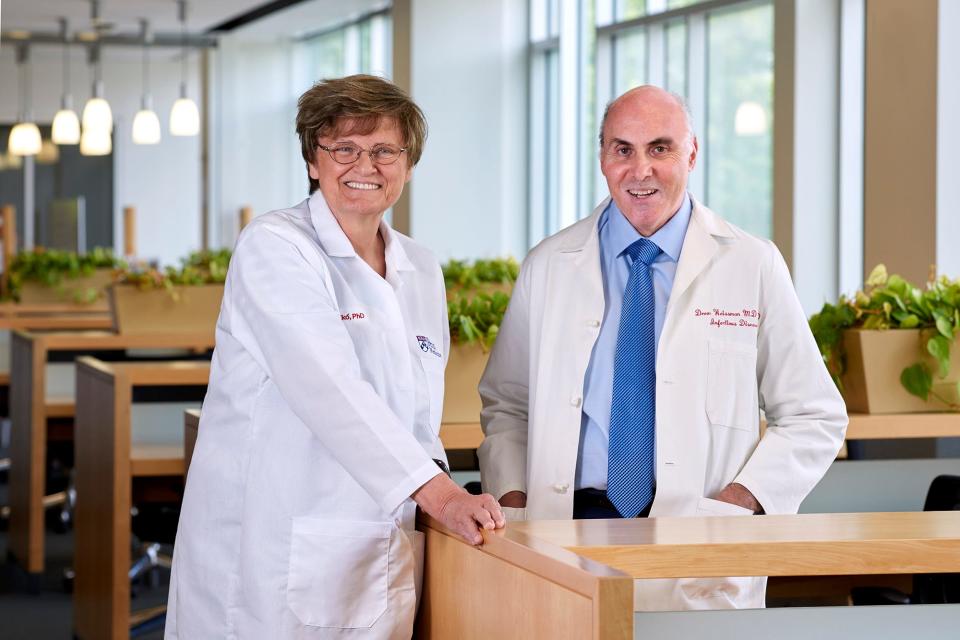University of Pennsylvania researchers win Nobel for vaccination work seen in COVID shots
- Oops!Something went wrong.Please try again later.
- Oops!Something went wrong.Please try again later.
Two University of Pennsylvania professors received one of society's highest honors for their work which resulted in the literal saving of thousands of lives.
Katalin Karikó, adjunct professor of neurosurgery at UPenn’s Perelman School of Medicine, and Drew Weissman, the Roberts Family Professor of Vaccine Research in the Perelman School of Medicine, won the 2023 Nobel Prize in Physiology or Medicine for their discoveries concerning nucleoside base modifications that enabled the development of effective mRNA vaccines against COVID-19.
"Katalin Karikó and Drew Weissman are brilliant researchers who represent the epitome of scientific inspiration and determination," said University of Pennsylvania President Liz Magill. "Day after day, Dr. Weissman, Dr. Karikó and their teams worked tirelessly to unlock the power of mRNA as a therapeutic platform, not knowing the way in which their work could serve to meet a big challenge the world would one day face."
Karikó, Weissman honored for critical work in developing effective COVID mRNA vaccines
The Norwegian Nobel Committee, the group that decides Nobel Prize Laureates, commended Karikó and Weissman for their work, which contributed to the accelerated rate of COVID-19 vaccine development.

Karikó and Weissman began working on the vaccine modification ahead of the worldwide rollout of mRNA, and have actually had something of a head start on peers due to their prior research.
In 2005, Karikó and Weissman published their discovery that mRNA could be altered and delivered effectively into the body to activate the body’s protective immune system.
Uptick in demand for new COVID vaccine: Want the new COVID vaccine in Bucks County? There may be a wait due to high demand
How mRNA vaccines works
According to vaccine producer Pfizer, mRNA — or messenger RNA — is a molecule that contains the instructions or recipe that directs the cells to make a protein using its natural machinery.
And the University of Pennsylvania noted that mRNA-based vaccines prompt a robust immune response, along with high levels of antibodies, that attack a specific infectious disease that has not previously been encountered.
Pfizer and Moderna utilized Karikó's and Weissman’s technology to build their vaccines.
COVID vaccine primer: COVID vaccine: What you need to know about booster shots from Pfizer, Moderna and J&J
"During the biggest public health crisis of our lifetimes, vaccine developers relied upon the discoveries by Dr. Weissman and Dr. Karikó, which saved innumerable lives and paved a path out of the pandemic," said J. Larry Jameson, dean of the Perelman School of Medicine. "More than 15 years after their visionary laboratory partnership, Kati and Drew have made an everlasting imprint on medicine."
What is a Nobel Prize?
The Nobel Prize is a set of awards given each year to those who “conferred the greatest benefit to humankind,” Nobel Prize founder Alfred Nobel said.
Nobel was an inventor, entrepreneur, scientist and businessman as well as a writer. When Nobel died, he left most of his fortune to establish these prizes, reflecting each of his interests. These categories are physics, chemistry, physiology or medicine, literature and peace. There is also the Prize in Economic Sciences, created in 1968 with a donation from Swedish central bank Sveriges Riksbank.
History of the Nobel Prize: What is the Nobel Prize? A history lesson on the coveted awards, plus famous past winners.
The nomination process for Nobel Prizes begins in September each year, with thousands of academics, scientists, past winners and parliamentary members submitting candidates. According to the Nobel Prize organization, the nominators “are chosen in such a way that as many countries and universities as possible are represented over time.”
The Physiology or Medicine is the first in the 2023 prizes to be announced. The Physics, Chemistry, and Literature and prizes will all be announced this week, with the Peace prize announced Friday.
The Sveriges Riksbank Prize in Economic Sciences in Memory of Alfred Nobel 2023 will be announced Oct. 9.
Karikó and Weissman add to UPenn's Nobel-winning lineage
Karikó and Weissman become the 28th and 29th recipients of the Nobel Peace Prize from the University of Pennsylvania, and the first since Gregg L. Semenza was awarded the Nobel in 2019 for his shared discovery of how cells sense and adapt to oxygen availability.
This article originally appeared on Bucks County Courier Times: Kariko, Weissman awarded Nobel for mRNA work seen in COVID vaccines

